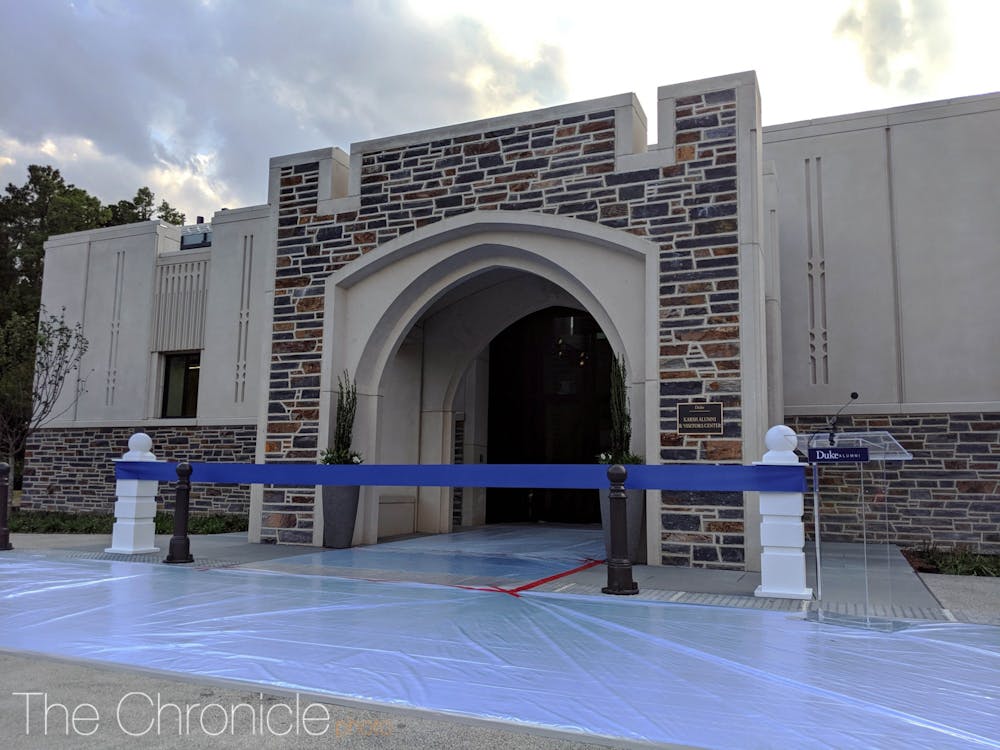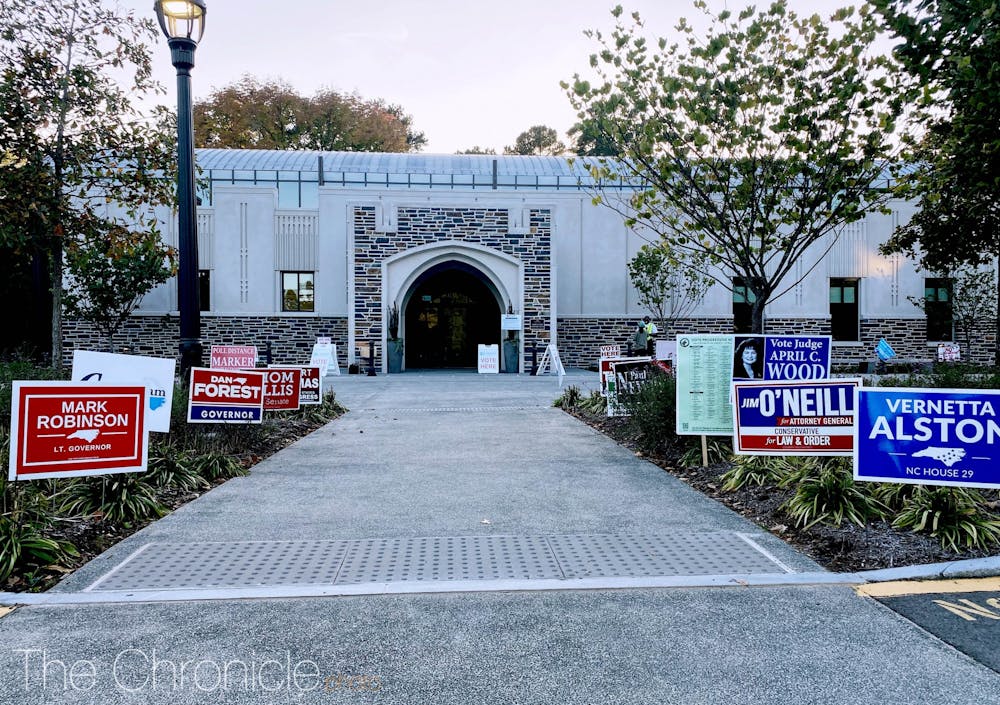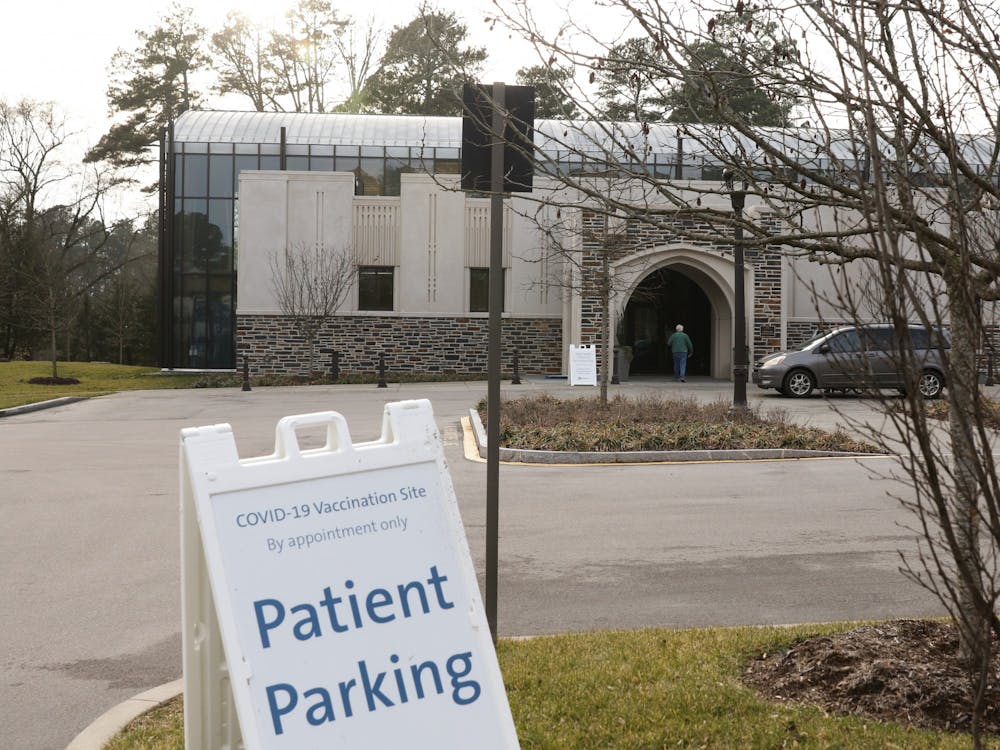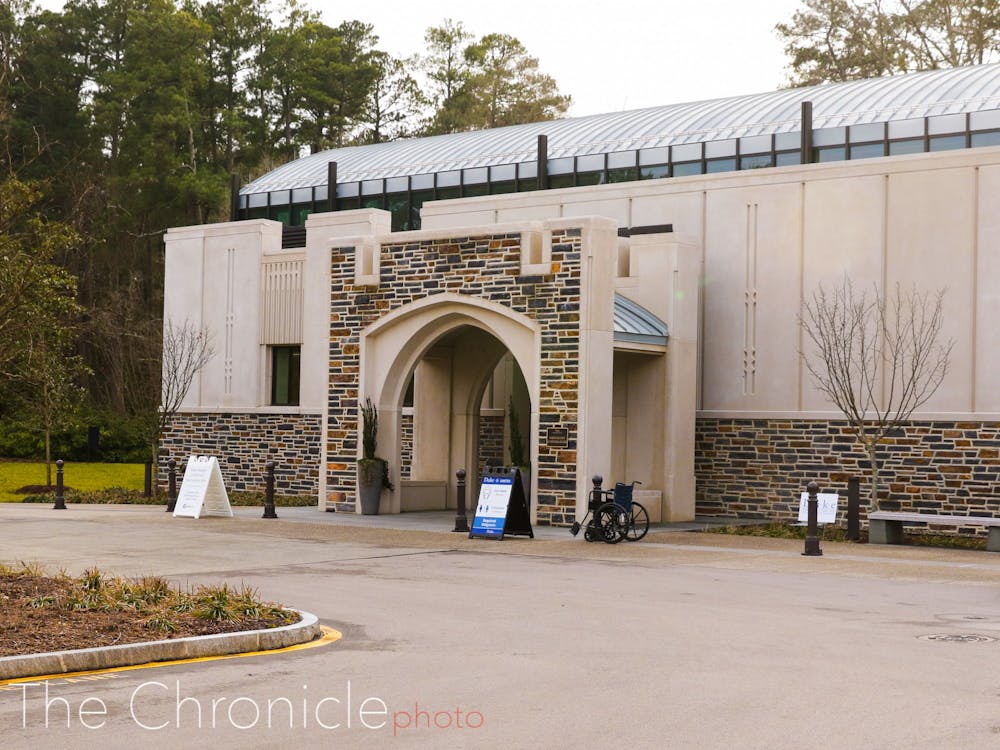If there were ever a building that embodied the phrase “jack of all trades,” the Karsh Alumni and Visitors Center would be it.
Opened in 2019 as a center for prospective students and visiting alumni to gather on campus, the Karsh building features 47,000 square feet of open space and study spots, as well as a boardroom, library, courtyard and marketplace.
Sterly Wilder, Trinity ‘83 and associate vice president for alumni affairs, told The Chronicle in 2019 that the center was envisioned to be “a place for studying, holding meetings, getting away from the noise and networking with alumni.”
After the spread of the COVID-19 pandemic and the cancellation of in-person campus tours and events, the Karsh building could no longer fulfill its intended purpose.

The Karsh Center opened in 2019 as a center for prospective students and visting alumni to gather on campus.
But devoid of students and alumni, Karsh gained a new role, becoming a multifunctional empty space. In the past few months, the building has morphed from an early voting center in the 2020 election to a vaccination site for the Durham community.
From Oct. 15 to 31 last semester, Karsh became a hotspot for anyone looking to take part in the election. Students, faculty and Durham residents flocked to Karsh in order to cast their ballot early. In just those two weeks in Durham County alone, there were 117, 842 ballots cast, and early voting in North Carolina reached an all-time high.
According to an unofficial tally by the county, 12,694 people voted at Karsh, making it the second-most-popular early-voting location.
Senior Emma DeRose was one of the many Duke students who chose to take a more active role in supporting the election by volunteering as a poll worker. Feeling excited to vote in a swing state where she felt her vote held greater significance, DeRose “wanted to do everything she could to help contribute in any way” to the election, so she applied to be a poll worker and was assigned to work at Karsh.
“I worked in a variety of rotational positions, whether it’d be checking people in, doing same day registration for people who were not registered to vote, or handing out stickers, just a variety of roles,” DeRose said. “One day I was on sanitation, which meant cleaning the polling station.”
DeRose also worked at a polling site at a recreational center in Durham, but she said she felt Karsh was much safer due to its larger size, open space and greater efforts to maintain social distancing.
“Voting at Karsh went really smoothly,” she said. “I think it was the second-biggest polling location in terms of the number of people who early voted, so it was very busy, but it is a beautiful building, so it was nice to spend my seven hour shifts there. Karsh has a huge, empty room, so it was a really good setup for pandemic voting. We spread out all the booths and set up glass between the registration desks.”
One of DeRose’s friends, senior Cole Zaharris, also applied to be a poll worker and was assigned to Karsh. She agreed that the voting process was smooth, as there was hardly ever a line or hold-up. She said that the spaciousness of Karsh allowed people to flow freely through the building and avoid cramped spaces.

The Karsh building became a polling place during the 2020 election.
Zaharris said she enjoyed the community that Karsh fostered: The building brought together students, faculty and Durham residents. Since Zaharris was often the only student working a shift, she was able to bond with co-workers from Durham.
“Personally, my favorite part of volunteering was working curbside,” Zaharris said. “It was cold because it was October in Durham, but Karsh is such a nice building, and being outside and welcoming people into it gave me a sense of how much activity was going on outside the building. People would be walking along the street and casually come right in. Getting to see people happy and smiling to come vote made standing outside my favorite spot.”
Get The Chronicle straight to your inbox
Sign up for our weekly newsletter. Cancel at any time.
Zaharris said she believes Karsh should continue to be a polling site in future elections.
“I think the Durham community appreciates when Duke offers centers on campus for things like voting,” she said. “A large majority of people voting from the Durham community were those who could walk to Karsh or bike there or get there really easily. While I was working, I heard someone say that on their neighborhood forum someone posted that Karsh was very easy and that there were no wait times, so that brought more people in to vote.”
When early voting ended Oct. 31 and the locations were closed, it seemed as if Karsh would revert to simply another building on campus emptied by COVID-19. But it was COVID-19 that gave Karsh its new purpose for the 2021 spring semester: The building became a health center.
On Jan. 6, Duke Health began the process of administering vaccines to local Durham residents over the age of 75 at the Karsh center. Those over the age of 65 can request to be put on a waitlist for the vaccination. As of Feb. 11, Karsh had vaccinated 15,108 patients.
Gail Shulby, co-chair of Duke University Health System Universal Flu Vaccination & COVID-19 Vaccination Planning Work Groups, emphasized the building’s convenience and support for the Duke Health staff. She wrote in an email that using Karsh as a vaccination center has been “easy” and “fantastic,” as the Alumni Affairs team has been very accommodating.
“[Karsh] has a large open space that we were able to adapt to our workflow while maintaining social distancing,” Shulby wrote. “Our target population for this location for the time being has been our 65 and older folks, so it was important that we have an accessible location. Karsh is very accessible. The parking is very convenient. It's easy to get to. Everyone has been very supportive in helping us deliver the vaccine to this vulnerable population.”
Shulby wrote that the only modification that needed to be made was a boost in electrical power to support refrigerators for vaccine storage.

Most recently, Karsh has become a COVID-19 vaccination center.
Penny Wang, a biomedical sciences graduate student at the Duke School of Medicine, volunteered at the vaccine clinic at Karsh and worked as a screener, observer and vaccinator. She described a normal day at Karsh as exhausting but rewarding.
“I am on my feet for the entirety of my shift guiding patients in from the front door as a screener and then the exit as an observer after they received the vaccine,” Wang wrote in an email. “As a vaccinator, I go through their pertinent medical history with them thoroughly and give them their vaccine.”
Wang wrote that although there are moments where Karsh becomes “hectic,” all of the workers there understand that each patient that walks through the door will receive “top and quality care.”
“Above all, my overall role is to make sure that they have a positive experience through Karsh,” Wang wrote. “People will come with all sorts of emotions, medical histories, and circumstances. In the end, everyone at the Karsh works together to figure every piece of the puzzle out.”
Alison Korn is a Pratt senior and enterprise advisor of The Chronicle's 119th volume.

